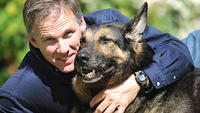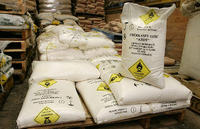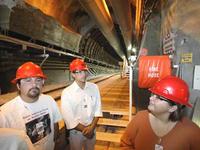-
Dallas launches regional nuke detectors
The Dallas police will soon be participating in a regional radiological nuclear detection program that will help law enforcement officials detect any anomalies and help protect against any nuclear or radiological attacks
-
-
Marines deploy bomb-sniffing dog alternative
When bomb-sniffing dogs at Camp Lejeune, the Marine base in North Carolina, are unavailable, military police turn to Fido; the Fido XT Explosives Detector is a handheld device that is capable of sniffing out explosives or residuals in vehicles
-
-
Underwater nuke detecting drone
Unmanned underwater vehicles (UUV) could soon be prowling the nation’s coastline to detect radiological and nuclear threats; the underwater drones, developed by New Jersey based Princeton Security Technologies, Inc., are equipped with radiological isotope identification hardware to monitor any changes below the water
-
-
Aussies to clone explosives sniffer dogs

Two Aussie dog-breeding companies will collaborate with South Korean scientists on cloning explosives and drug sniffer dogs; the first batch of ten dogs will go into service in 2013; the Australians cloned dogs would be made from tissue samples taken from a German shepherd called Hassan von Gruntal, who died in 2001; cloned sniffer dogs have already been used in South Korea and the United States
-
-
Statistics helps calculate uncertainty of aging U.S. nukes

How do you test a not-so-young nuclear stockpile for the effects of age when you cannot detonate any for the sake of finding out? The U.S. government has not conducted live nuclear tests since the early 1990s, but a BYU scientist offers solid answers — based on statistical analysis and without setting off any weapons
-
-
DNDO formally approves Smiths Detection’s RadSeeker
Smiths Detection’s newly launched RdSeeker radiation detection has been formally approved by DHS Domestic Nuclear Detection Office (DNDO) for production and deployment
-
-
1st Detect receives U.S. patent for chemical detector
A portable mass spectrometry detector, capable of detecting residues and vapors from explosives, chemical warfare agents, toxic chemicals, food and beverage contamination, illicit drugs and pollution, is awarded U.S. patent
-
-
New device identifies unknown liquids instantly
Materials scientists and applied physicists have invented a new device that can instantly identify an unknown liquid; the 3D-nanostructured chip offers a litmus test for surface tension (and doubles as a carrier for secret messages); the researchers are currently developing more precisely calibrated chips and conducting field tests with government partners for applications in quality assurance and contaminant identification
-
-
DHS slow to crack down on ammonium nitrate sales

U.S. lawmakers are becoming frustrated with DHS for its slow implementation of regulations on ammonium nitrate fertilizer, a key ingredient in dangerous homemade explosives like the one used in the deadly 1995 Oklahoma City bombing; Congress initially passed legislation tightening control on the sale of the fertilizer in 2008, but DHS has yet to implement such regulations and three years later is only now publishing a set of “proposed” rule
-
-
Portable detector can ID anthrax in one hour
Researchers have developed a portable device can detect the presence of the anthrax bacterium in about one hour from a sample containing as few as forty microscopic spores; the basic design, which is small enough to fit in the overhead compartment of an airplane, potentially could be tailored to detect countless other pathogens, such as salmonella, or be used in the field for DNA forensics
-
-
U.S. General: troops unprepared for nuke risks in Japan
A U.S. general admitted that U.S. troops stationed in Japan did not have the proper training or equipment to handle radiation exposure in the days immediately following the nuclear crisis at the Fukushima Daiichi power plant caused by the 11 March earthquake and tsunami
-
-
Sector Report for Monday, 1 August 2011: Detection
This report contains the following stories.
Plus 1 additional story.
-
-
Blue ribbon commission calls for interim off site waste storage

After deciding to stop the Yucca Mountain nuclear waste repository project, President Obama appointed a blue Ribbon commission to examine alternatives; the first report from the commission calls for interim storage of nuclear waste not on the site of nuclear power plants, and for the creation of a new corporation to develop one or more deep geological repositories “as expeditiously as possible”
-
-
Troubled $1.2 billion nuclear detection program cancelled
After news hit that DHS was planning on spending additional money to procure a troubled nuclear detection system that has been plagued with problems, the Obama administration decided to scrap the $1.2 billion program
-
-
New software to improve explosive detection
New software developed by Peaklet Analysis with the aid of a Western Kentucky University (WKU) math professor could help existing explosives detectors improve their detection abilities
-